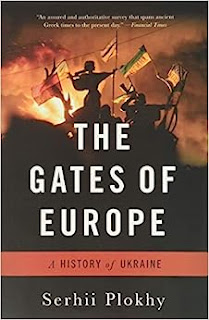from The Gates of Europe: A History of Ukraine by Serhii Plokhy:
The rift between the new leadership in Moscow and the leaders of Ukraine came to the fore soon after the worst technological disaster in world history—the April 1986 explosion at the Chernobyl nuclear power plant located less than seventy miles north of Kyiv—hit Ukraine. The idea of bringing nuclear energy to Ukraine belonged to Ukrainian scientists and economists; Petro Shelest, who wanted to create new sources of electrical energy for the rapidly developing Ukrainian economy, had lobbied for it in the 1960s, during his tenure as party bosses of the republic. By the time the Chernobyl nuclear power station went online in 1977, Ukrainian intellectuals, including one of the leading lights of the sixties generation, Ivan Drach, were welcoming the arrival of the nuclear age in their country. For Drach and other Ukrainian patriots, Chernobyl represented a step toward the modernization of Ukraine. He and other enthusiasts of nuclearization failed to notice, however, that the project was run from Moscow, with most of the power plant’s skilled personnel and management coming from outside Ukraine. The republic was getting electrical energy but had little control over what was going on at the plant, which, like all Soviet nuclear facilities, and indeed most of Ukraine’s industrial enterprises, was under the jurisdiction of all-union ministries. The plant itself and the accident that occurred there became known to the world under the Russian spelling of the name of the nearest city—Chernobyl, not Chornobyl.
When on the night of April 26, 1986, the fourth reactor of the Chernobyl power station exploded as a result of a turbine test that went wrong, the Ukrainian leaders suddenly realized how little control they had over their own destinies and that of their republic. Some Ukrainian officials were invited to join the central government commission dealing with the consequences of the accident but had little influence there, finding themselves obliged to follow instructions from Moscow and its representatives at the site. They organized the resettlement of those dwelling in a thirty-kilometer zone around the station but were not allowed to inform the population of the republic about the scope of the accident and the threat that it posed to the health of their fellow citizens. The limits of the republican authorities’ power over the destiny of Ukraine became crystal-clear on the morning of May 1, 1986, when the winds changed direction and, instead of blowing north and west, turned south, bringing radioactive clouds to the capital of Ukraine. Given the quickly changing radiological situation in a city of more than 2 million people, the Ukrainian authorities tried to convince Moscow to cancel a planned parage marking International Workers’ Day. They failed.

No comments:
Post a Comment